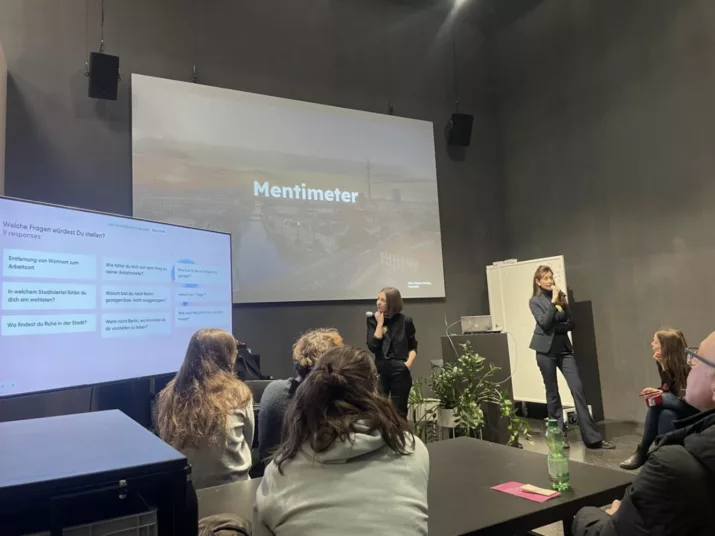
Workshop as Part of the Citizen Science Project “Your Emotional City”
How the City Affects our Psyche
On the streets of the city, life pulsates with a constant rhythm of mobility and noise. In our ever-evolving world, we bring together researchers and ordinary citizens to find holistic approaches to promoting mental health in the city.

For this reason, at the end of February, we hosted a workshop to explore the influence of urban life on the psyche of city dwellers.
Die Veranstaltung war Teil des Citizen-Science-Projekts "Deine emotionale Stadt", einer Kooperation des Interdisziplinären Forums Neurourbanistik e.V., der Charité – Universitätsmedizin Berlin, der Humboldt-Universität zu Berlin und dem Futurium – Haus der Zukünfte.
Dr Shadi Bagherzadeh Azbari, researcher at Charité – Universitätsmedizin Berlin in the fields of psychiatry and psychotherapy, and Sephira Kolbe, doctoral student and project coordinator at Humboldt-Universität zu Berlin, introduced everyone to the project “Your Emotional City”. In the subsequent workshop, the participants discussed many questions concerning mental well-being in the city. They talked about scientific findings on the promotion of mental health in cities; the project representatives presented the study’s initial results. The workshop concluded with a lively and interactive exchange on the topics of urban development, stress, loneliness and mental health in the city.
The invisible burden of urbanity
Life in the city offers us numerous possibilities – be they encounters with people from all over the world, places that draw us in for further exploration, or ways of seeing that ravish our senses. A kaleidoscope of urban diversity in which every encounter tells a new story. The modern city is a melting pot of cultures and lifestyles, where people of different origins, and from all walks of life, come together.
The workshop discussed the numerous challenges we face every day in city life. The ever-changing rhythm of the city can evoke a sense of urgency that manifests itself in the form of stress or even psychological strain. The sense of being constantly available for others, the traffic, the crowds of people – all of these can become stress factors that have a negative impact on our mental health.
In the workshop, it became clear that, amidst the hustle and bustle, there are hidden secrets of the human psyche yet to be explored by science and society. Scientific findings provide us with valuable insights into the complex relationships between city life and mental well-being. The answers to these issues cannot be found in laboratories and studies alone.
City dwellers are the architects of their own well-being. They shape the urban landscape not only with buildings and streets, but also with their social ties and their sense of community. By advocating for safe, welcoming public spaces and by building supportive networks, they can create an atmosphere of resilience and well-being.
At the end of the workshop, everyone agreed that the alliance of science and citizens is crucial for shaping a future in which mental health is firmly integrated into the urban lifestyle. This partnership can contribute to creating a vibrant city in which mental well-being is just as important as architecture and urban design.
Our next events
If you missed this workshop, don’t worry, because our next exciting event will take place on 20 June at 19:00! Our guests will be: Juli Zeh (writer, lawyer and judge), Professor Dr Mazda Adli (psychiatrist, stress researcher at Charité – Universitätsmedizin Berlin, and chief of medicine at the Fliedner Klinik Berlin) and Professor Dr Lukas Haffert (political scientist and author of the book “Stadt – Land – Frust”[City – Countryside – Frustration]). Here you can secure your ticket!
The research project “Your Emotional City” works with Berlin residents to investigate how the city influences our daily well-being. Its goal is to find out what a healthier city of the future could look like. Around 1,500 people have already participated in the study. You too can become an urban researcher, simply by downloading the Urban Mind app in the App Store or in Google Play.